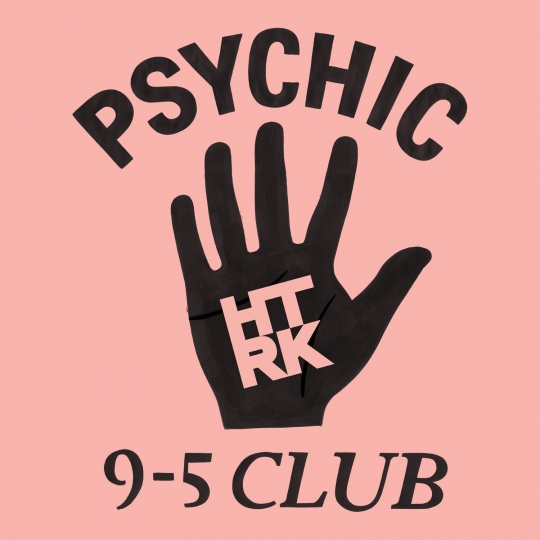It’s impossible to talk about Psychic 9–5 Club without talking about tragedy. The press release accompanying advance copies of the album makes this explicit: this is, after all, the first HTRK album without any input from founding member Sean Stewart, who took his own life as the band were working on their second album, 2011’s Work (Work, Work). Even in their original three-piece incarnation, HTRK were no strangers to tragedy, having worked closely with Australian post-punk legend Rowland S. Howard – on both their own debut, Marry Me Tonight, and Howard’s final solo album Pop Crimes – before his untimely passing in 2009. You can therefore forgive Ghostly International’s publicists for pushing the band-marked-by-tragedy-makes-record-about-hope narrative, because in one sense it’s absolutely true: HTRK absolutely have known a great deal of tragedy – far more than their fair share of it – and Psychic 9–5 Club is indeed a record with a sunnier disposition than the claustrophobic Work (Work, Work).
It’s not quite as simple as the above précis implies, though, because there’s a good deal of continuity between the old HTRK and the new. The title gives as much away – from Work to 9–5, the shift here isn’t from labour to leisure but from the mundane to the mundanely supernatural. (In many ways Psychic 9–5 Club reminds me of Hilary Mantel’s excellent novel Beyond Black, which charts in soul-crushing detail the utter banality of its psychic protagonist’s life – although Psychic 9–5 Club doesn’t have anywhere near as much of the mordant wit that makes Beyond Black a pleasure to read.) The opening strands of Psychic 9–5 Club, too, sound like a pared-back version of Work (Work, Work)‘s molasses-slow hellscape: sub-bass bloops punctuated by an etiolated 808 beat. Soon enough, though, the differences emerge: ‘Give It Up’ contains none of the mechanical grit that so thoroughly silted up between the cogs of Work (Work, Work)‘s desiring machines; in comparison to, say, ‘Eat Yr Heart’, it comes off as sparkling clean. Jonnine Standish’s vocals, too, have undergone a transformation. For all that the lyrics of ‘Give It Up’ deal with paradigmatically HTRK-ian themes (“Hey boys, give it up / this way / when you talk / you talk with more than your mouth full”), Standish’s delivery is not the dirgy sprechstimme of Work (Work, Work) but a more playful and melodic sprechgesang. This confluence of continuity and rupture renders ‘Give It Up’ semantically indeterminate – when Standish sings “This time, I’m gonna love you much better”, is it with the same acid tongue she deployed to skewer a similar sentiment in Work (Work, Work)‘s ‘Synthetik’, or is this more than a hollow promise mockingly repeated?
In many ways the play between continuity and rupture has been HTRK’s metier: from the feedback-shrouded dirges of Nostalgia to the cleaned-up post-punk of Marry Me Tonight to the chilly codeine electronics of Work (Work, Work), they are a band that has defined a signature aesthetic against a changing roster of instrumentation, producers, and approaches. Yet for all the superficial change there has been a deep continuity, a patient marking out of a territory (characterised by themes of sex, work, desire, and dread) that the group can truly call their own, no matter what techniques they use to explore it. Psychic 9–5 Club, by contrast, moves the band away from their home turf while utilising similar techniques to those of Work (Work, Work) – flipping the script so the continuity is superficial and the rupture deep. What else could explain a song like ‘Blue Sunshine’, in which a po-faced Standish coos “healthy dose of inner peace, blue sunshine” as though she were a heavily-medicated Fiona Horne? Or the giggles of Standish and musical partner Nigel Yang that permeate throughout the instrumental ‘Feels Like Love’?
If we must have a biographical explanation for HTRK’s shifting priorities, one might come not from the absence of recent tragedy (the duo relocated from London back to Australia for “family reasons”, according to Dazed) but rather from a changed context. Prior to their departure for Berlin and London, HTRK were a Melbourne band whose touchstones and collaborators all hailed from Australia’s chilly, black-clad city; on their return to Australia, they’ve landed instead in Melbourne’s great rival, Sydney, an altogether sunnier and more exuberant place. While this change hasn’t exactly rendered them into The Presets – an archetypically Sydney band if ever there was one – it seems as though the extra vitamin D and humidity has opened up the previously closed circle of their work. Even as Standish admits “You know, I’ve got mood swings I can’t stop” on album highlight ‘Chinatown Style’, a certain grace and elegance that has previously been absent from HTRK’s work slowly blossoms in the background.
Psychic 9–5 Club therefore represents not strictly a departure for HTRK but rather a line of flight from one point to … well, it’s hard to tell where exactly they’re going, but somewhere other than the hermetically sealed nightmare of sex and degradation they’d previously made their home. For this reason, it is in many ways the least HTRK-y of their albums, and those who were enamoured by their previous work may find the whiff of new age mysticism and rigorous cleanliness of this album a little disappointing. But if nothing else it’s a fascinating document: a snapshot of a band slowly breaking out of the prison of their own aesthetic and bravely denying the tragedies that have marked their progress the power to define them any further.


